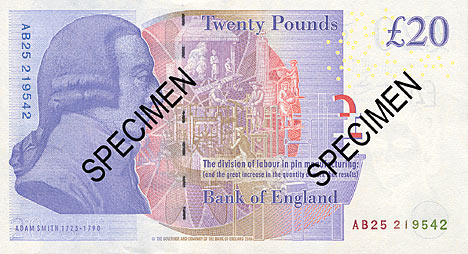Why we don't know the man on the £20 note from Adam
13th March 2007
On the day when Adam Smith replaces Sir Edward Elgar on the £20 note, three-quarters of Britons say they have no idea who he is.
Smith was an 18th-century philosopher and political economist who played a key role in the intellectual movement known as the Scottish Enlightenment.

British economist Adam Smith - the father of modern economics and famous for writing "The Wealth of Nations" - replaces composer Edward Elgar's image on the back of the new £20 note. The writing says "The division of labour in pin manufacturing: (and the great increase in the quantity of work that results)"
But that, say the public, does not qualify him to grace the reverse of the new notes. They have called for better-known British icons such as Winston Churchill, Emmeline Pankhurst and Princess Diana to be immortalised on our cash.

The front of the new £20 note.
Churchill won the vote of 52 per cent of those polled by Virgin Money. He swept the board among male contenders, way ahead of second-placed Professor Stephen Hawking with eight per cent.
John Lennon, who sang: "Money can't buy me love", and Spike Milligan, who declared: "Money can't buy you happiness but it does bring you a more pleasant form of misery", came joint third with seven per cent each.
On the female list, Emmeline Pankhurst, one of the founders of the British suffragette movement, who called for "equal pay for equal work", just pipped Diana to the number one spot.
Jason Wyer-Smith, of Virgin Money, said that he was surprised that the late Princess of Wales had not come out on top.
"I suppose people might be getting a bit sick of her. It's ten years after her death, and she's still all over the papers."
dailymail.co.uk
13th March 2007
On the day when Adam Smith replaces Sir Edward Elgar on the £20 note, three-quarters of Britons say they have no idea who he is.
Smith was an 18th-century philosopher and political economist who played a key role in the intellectual movement known as the Scottish Enlightenment.

British economist Adam Smith - the father of modern economics and famous for writing "The Wealth of Nations" - replaces composer Edward Elgar's image on the back of the new £20 note. The writing says "The division of labour in pin manufacturing: (and the great increase in the quantity of work that results)"
But that, say the public, does not qualify him to grace the reverse of the new notes. They have called for better-known British icons such as Winston Churchill, Emmeline Pankhurst and Princess Diana to be immortalised on our cash.

The front of the new £20 note.
Churchill won the vote of 52 per cent of those polled by Virgin Money. He swept the board among male contenders, way ahead of second-placed Professor Stephen Hawking with eight per cent.
John Lennon, who sang: "Money can't buy me love", and Spike Milligan, who declared: "Money can't buy you happiness but it does bring you a more pleasant form of misery", came joint third with seven per cent each.
On the female list, Emmeline Pankhurst, one of the founders of the British suffragette movement, who called for "equal pay for equal work", just pipped Diana to the number one spot.
Jason Wyer-Smith, of Virgin Money, said that he was surprised that the late Princess of Wales had not come out on top.
"I suppose people might be getting a bit sick of her. It's ten years after her death, and she's still all over the papers."
dailymail.co.uk
Last edited: